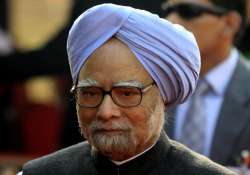PM Modi’s overnight currency ban can have severe economic ramifications: Manmohan Singh
Former Prime Minister Manmohan Singh today came down heavily on the central government once again over demonetisation drive.

Former Prime Minister Manmohan Singh today came down heavily on the central government once again over demonetisation drive.
In a blog published today, Singh said that while the intentions are honourable and deserve to be supported whole-heartedly, the decision will cause grievous injury to the honest Indian who earns wages in cash.
“The dishonest black money hoarder will get away with a mere rap on the knuckles,” it reads.
Stating that ‘money is an idea that inspires confidence’, he further writes, “In one impetuous decision, the Prime Minister has shattered the faith and confidence that hundreds of millions of Indians had reposed in the Government of India to protect them and their money.”
Warning the government that demonetisation scheme can have a ripple effect on GDP growth and job creation, he wrote: “It is my humble opinion that we as a nation should brace ourselves for a tough period over the coming months, needlessly so.”
“Consumer confidence is an important economic variable in a nation's growth prospects. It is now evident that the sudden overnight ban on currency has dented the confidence of hundreds of millions of Indian consumers, which can have severe economic ramifications... This can have rippled effect on GDP growth and job creation. It is my humble opinion that we as a nation should brace ourselves for a tough period over the coming months, needlessly so,” he said.
Underlying premise behind the decision of the Prime Minister to scrap high value denomination notes, said Singh, who was Prime Minister from 2004 to 2014, said that the ‘declaring currencies as illegal overnight seems to be false notion that ‘all cash is black money and all black money is in cash’. This is far from reality.”
“More than 90 per cent of India's workforce still earn their wages in cash. These consist of hundreds of millions of agricultural workers, construction workers and so on,” he added.
He pointed out that more than 600 million Indians still lived in towns and villages with no bank and cash was the bedrock of their lives.
"To tarnish these as 'black money' and throw the lives of these hundreds of millions of poor people in disarray is a mammoth tragedy," he writes.
The demonetisation has led to an unprecedented cash crunch across the country, he said, adding that the Reserve Bank of India (RBI) is unable to supply adequate cash in exchange for the 86 per cent of all currency that was spiked.
Singh, who was the Finance minister when India unleashed economic reforms in 1991, said PM Modi's stated intentions behind the note ban -- fighting fake currency as well as corruption and black money -- were honourable.
"However, the popular saying 'the road to hell is paved with good intentions' serves as a useful reminder and warning in this context," he said.
Chiding the government for introducing the Rs 2,000 note, he went on: "This brazen policy measure (demonetisation) has neither tackled the stock of black money holistically nor has it stemmed the flow of it."
He said that other countries which went for currency swap did so over a period of time "and not as a sudden overnight operation".
"As someone who has experienced long lines for rationed food during war time, I never imagined that one day I would find my own countrymen and women waiting endlessly for rationed money. That all of this suffering is due to one hasty decision makes it even more disconcerting," he said.
Singh had earlier slammed the government during a debate in Rajya Sabha calling the decision a ‘monumental mismanagement.’